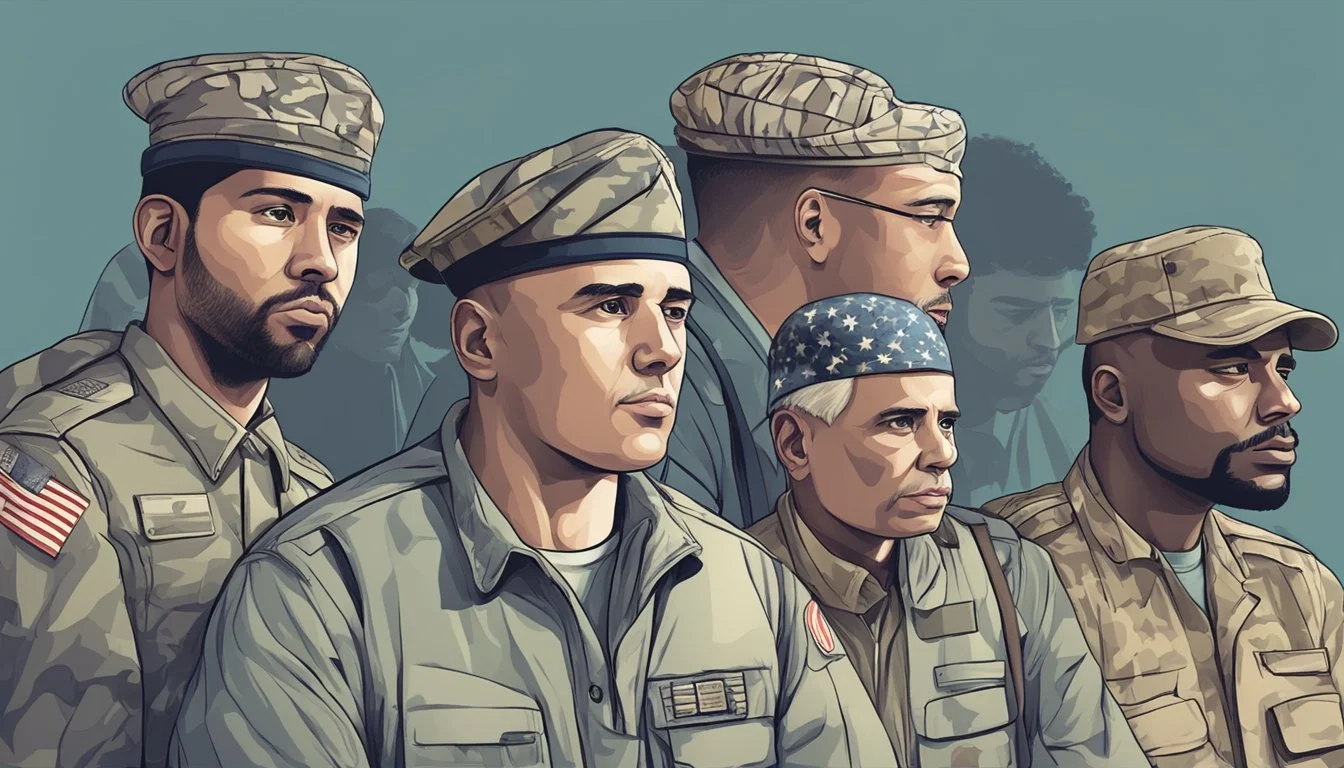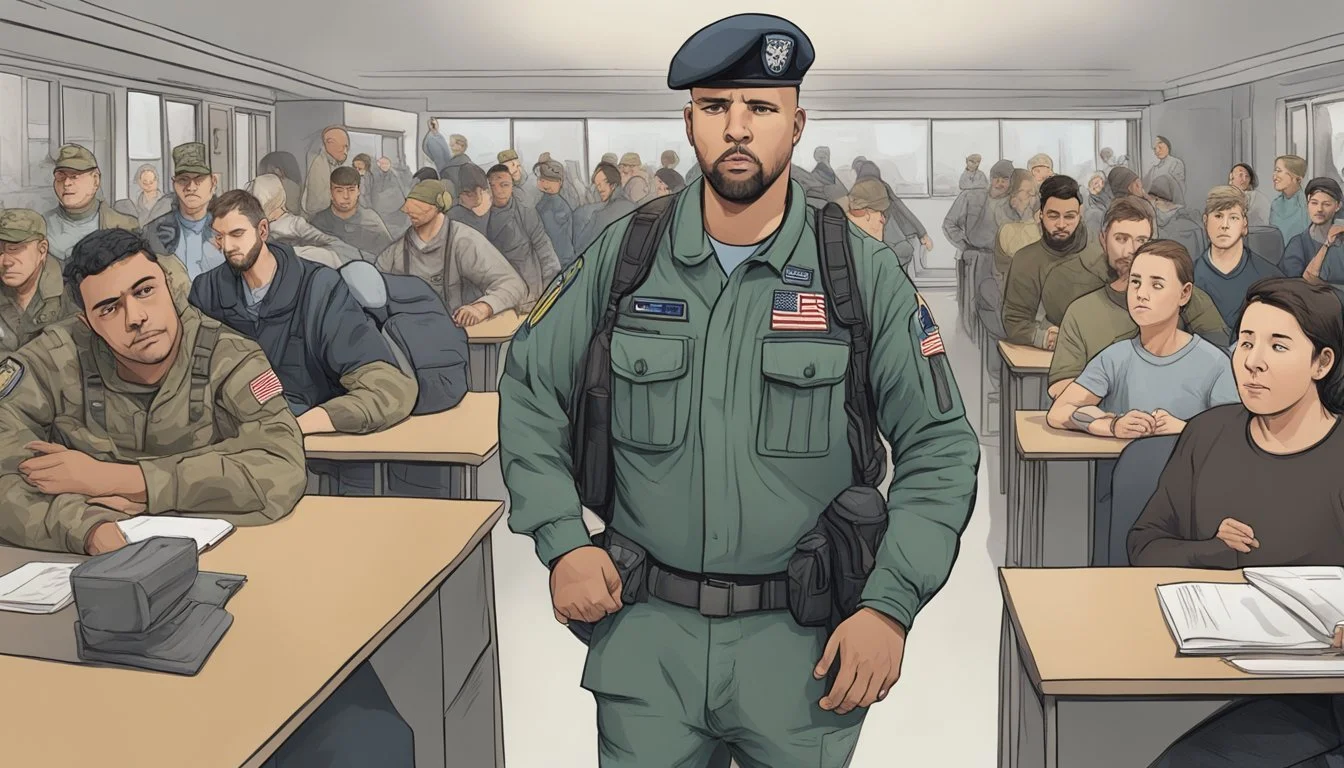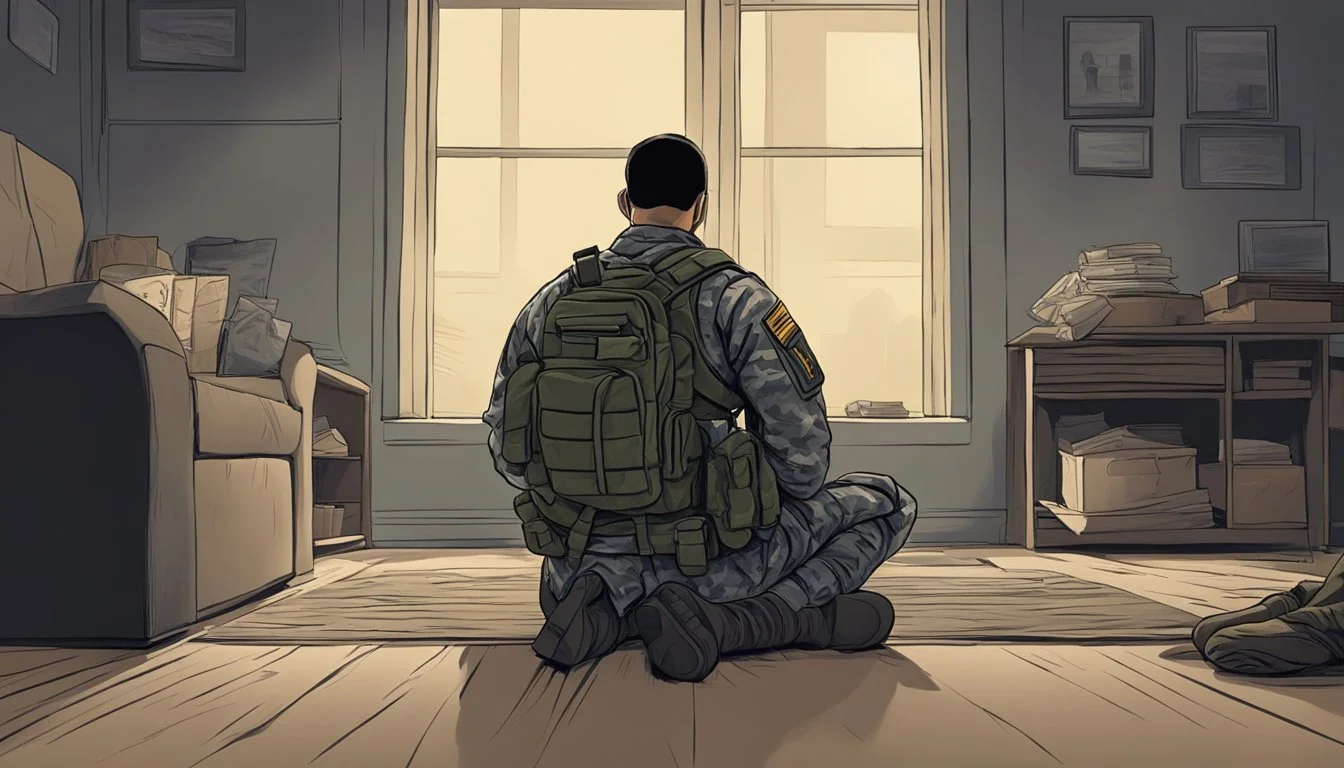9 Common Challenges Faced by Veterans with PTSD
Understanding Their Struggles
Post-traumatic stress disorder (PTSD) is a significant mental health challenge that many veterans face upon returning to civilian life. This condition can profoundly impact various aspects of their well-being, from daily functioning to maintaining relationships and pursuing employment opportunities.
Understanding these challenges is crucial for providing the necessary support and resources to help veterans effectively manage their condition and improve their quality of life. Addressing these difficulties can lead to better mental health outcomes and facilitate smoother transitions back to civilian life.
1) Difficulty Sleeping
Sleep problems are a major challenge for veterans with PTSD. Insomnia is reported to occur in a striking 90-100% of affected veterans. This condition makes it difficult to fall asleep, stay asleep, or achieve restful sleep.
PTSD also leads to frequent nightmares, which disrupt sleep and cause distress. For many veterans, these nightmares are vivid and recurring, further complicating their sleep patterns.
Sleep apnea is another concern. This breathing disorder is common among those with PTSD and often leads to feeling tired throughout the day. Veterans may struggle to identify and manage this problem, exacerbating their daytime fatigue.
Addressing these sleep issues is crucial for improving the overall well-being of veterans with PTSD.
2) Hypervigilance
Hypervigilance is a common symptom experienced by veterans with PTSD. This heightened state of awareness often results from prolonged exposure to combat stress and specific military training. Veterans may be constantly on alert, watching for potential threats even in safe environments.
This constant state of readiness can lead to significant challenges in daily life. Veterans may find it difficult to relax or enjoy activities, feeling tense and anxious.
Hypervigilance can also interfere with sleep patterns. Veterans might have trouble falling asleep or staying asleep, frequently waking up to check their surroundings. This can result in chronic fatigue and additional stress.
Social interactions are often impacted as well. Veterans might avoid crowded places or social gatherings for fear of perceived threats, contributing to feelings of isolation.
Effective treatment options for managing hypervigilance are available. Therapeutic approaches and empirically supported treatments for PTSD can help veterans reduce hypervigilance and regain control over their daily lives.
3) Flashbacks
Flashbacks are a common symptom experienced by veterans with PTSD. These episodes involve re-experiencing the traumatic event vividly, as if it was happening in the present moment. This might occur through intrusive thoughts, images, or sensations linked to the traumatic events.
Flashbacks can be triggered by various stimuli, including sounds, smells, or sights that are reminiscent of the trauma. For veterans, certain noises or environments may bring back memories of combat or life-threatening situations. These triggers can occur unexpectedly, causing extreme distress.
During a flashback, veterans might react physically as though they are in actual danger. They may exhibit signs of panic, sweating, or rapid heartbeat. This intense reaction can interfere with their daily life and relationships.
Some veterans avoid situations that may trigger flashbacks, potentially leading to social isolation. This avoidance can further exacerbate feelings of loneliness. Veterans often need support to manage these episodes.
Veteran support services may be invaluable for those dealing with flashbacks. Organizations such as the Veterans Affairs offer resources and treatment options to help manage PTSD symptoms, including flashbacks. Additionally, Vet Centers provide specialized counseling for veterans experiencing these issues.
4) Avoidance Behavior
Avoidance behavior is a common symptom of PTSD in veterans. This behavior manifests when individuals steer clear of reminders related to their traumatic experiences.
Veterans may avoid specific places, activities, or people that trigger distressing memories. This can limit their social interactions and daily activities, thereby contributing to a restricted lifestyle.
Emotional avoidance is another aspect. Veterans may suppress their feelings to escape overwhelming emotions tied to their trauma.
This behavior not only isolates them but also amplifies feelings of helplessness and hopelessness.
The impact of such avoidance extends to social relationships, as veterans might withdraw from family and friends.
This withdrawal can further deepen their sense of isolation and exacerbate symptoms of depression and anxiety.
5) Emotional Numbness
Emotional numbness is a common symptom faced by veterans with PTSD. This condition often makes it challenging for individuals to experience emotions fully, leading to a sense of detachment from others and their surroundings.
Veterans may struggle to connect with loved ones because emotional numbness hinders the ability to engage in meaningful relationships. This can result in feelings of isolation and loneliness.
The inability to feel joy or sadness can also extend to everyday activities. Veterans might find it difficult to enjoy hobbies or activities that they once found pleasurable, contributing to a reduced quality of life.
Emotional numbness can also lead to difficulties in professional settings. Veterans may have trouble expressing emotions or reacting appropriately in social situations, which can impact workplace relationships and productivity.
There are various therapies and approaches to address emotional numbness. For instance, trauma-focused cognitive-behavioral therapy and mindfulness practices have shown promise in helping veterans reconnect with their emotions.
Recognizing and addressing emotional numbness is crucial for helping veterans regain their emotional health and improve their overall well-being. More information on how mindfulness can aid in this process can be found in this detailed overview.
Addressing emotional numbness as part of a comprehensive PTSD treatment plan can significantly enhance a veteran’s quality of life and interpersonal relationships.
6) Anger and Irritability
Anger and irritability are frequent challenges for veterans with PTSD. These emotions can stem from the heightened arousal state often associated with the condition. Veterans may find themselves constantly on edge or easily provoked.
PTSD can make emotional responses more intense. Veterans might experience anger more frequently and with greater severity than before. This can affect personal relationships and everyday interactions.
Hyperarousal is a key symptom of PTSD, contributing to irritability and anger. Veterans may find it difficult to relax, leading to frustration and outbursts. This continuous state of alert can be exhausting and disruptive.
Living with PTSD means that even minor triggers can provoke a significant emotional response. Veterans might struggle with controlling these reactions, which can create further challenges in their daily lives. Anger management techniques and therapy can be beneficial in managing these symptoms.
The impact of anger and irritability isn’t limited to personal feelings. It can extend to professional settings and social interactions, creating obstacles in maintaining employment and building support networks. Recognizing these issues is the first step in seeking appropriate help and resources. For more information, visit Anger, Trauma, and PTSD.
7) Relationship Strain
Veterans with PTSD often experience relationship strain that can affect their connections with family, friends, and romantic partners. The psychological impacts of PTSD, such as emotional numbness, irritability, and difficulty trusting others, can create barriers in communication.
Partners of veterans with PTSD may report lower levels of happiness and life satisfaction. Many find that their roles shift significantly as they take on caregiving responsibilities, which can lead to their own psychological distress.
Open communication, patience, and understanding are crucial for maintaining healthy relationships. Efforts to seek therapy or counseling can provide support for both veterans and their partners, helping to navigate the complex dynamics that PTSD introduces into personal relationships.
For more information on the effects of PTSD on partners of veterans, visit the National Center for PTSD. Seeking support from programs like the VA's Coaching Into Care can also be beneficial in addressing relationship challenges.
8) Anxiety
Anxiety is a frequent companion to veterans with PTSD. This mental health issue can manifest as persistent worry, nervousness, or fear. Veterans may find themselves constantly on edge, anticipating danger even in safe environments.
Symptoms of anxiety in veterans can include trouble sleeping, irritability, and difficulty concentrating. These issues often overlap with other PTSD symptoms, complicating the diagnosis and treatment process.
Veterans suffering from PTSD-related anxiety may struggle to engage in daily activities. Their ability to work, socialize, and maintain healthy relationships can be severely impacted.
Understanding the ratings for anxiety disorders is crucial. For instance, veterans with specified anxiety disorders might receive a Diagnostic Code 9410 with ratings varying based on severity.
The presence of anxiety can also exacerbate feelings of isolation. Veterans might withdraw from social circles, fearing judgment or misunderstanding. The challenge lies in managing these symptoms while seeking appropriate treatment to improve overall mental health.
9) Depression
Depression is a significant issue for many veterans with PTSD. It often manifests as a prolonged period of low mood, making it difficult for individuals to engage in daily activities. Unlike a transient feeling of sadness, depression can persist over weeks, months, or even years.
Veterans may experience depression as a response to the traumatic events they witnessed or participated in during their service. The symptoms can include a lack of interest in previously enjoyed activities, changes in appetite, and difficulty sleeping. This can severely impact their quality of life.
The relationship between PTSD and depression is complex. PTSD can exacerbate feelings of depression and vice versa, creating a cycle that can be challenging to break. This intertwined nature means addressing both conditions simultaneously is crucial for effective treatment.
Depression not only affects mental health but can also lead to physical symptoms such as fatigue and chronic pain. Veterans suffering from depression might find it difficult to seek help, which can delay treatment and recovery. The stigma around mental health in military culture can further complicate this issue.
Access to appropriate mental health care is vital for veterans dealing with both PTSD and depression. Support from family, friends, and mental health professionals can play a crucial role in managing these conditions and improving overall well-being.
Understanding PTSD in Veterans
Post Traumatic Stress Disorder (PTSD) can significantly impact Veterans, often arising from their unique experiences in military service. This condition can manifest in various forms and stem from specific traumatic events.
What is PTSD?
PTSD is a mental health condition triggered by experiencing or witnessing a traumatic event. For Veterans, this might include combat exposure, training accidents, or assaults during their service. The symptoms can vary widely but usually involve disturbances like flashbacks and severe anxiety.
Diagnosis requires symptoms lasting more than a month and significantly affecting daily life. It's crucial for Veterans to recognize these symptoms early to seek appropriate treatment.
Causes of PTSD in Veterans
The causes of PTSD in Veterans are often linked to their specific duties and experiences during military service. Common causes include combat exposure, where individuals witness death or serious injury, and non-combat traumas like military sexual trauma.
Another cause is the high-stress training environment. Veterans might also see significant long-term psychological effects from extended deployments and the constant threat to personal safety. These experiences can significantly alter brain function and emotional regulation.
Symptoms and Diagnosis
PTSD symptoms in Veterans are diverse and can affect their mental and physical health. Key symptoms include intrusive memories, where individuals relive the traumatic event through flashbacks or nightmares, and avoidance behaviors, such as steering clear of places or activities that remind them of the event.
Other symptoms involve changes in mood and cognition, like negative thoughts about oneself or others, and hyperarousal symptoms, such as being easily startled or having angry outbursts.
Diagnosis involves a comprehensive assessment by a mental health professional and can involve questionnaires and interviews to ensure the symptoms align with PTSD. Early and accurate diagnosis is vital for effective treatment and management.
Impact of PTSD on Daily Life
PTSD significantly affects veterans on multiple fronts, from emotional well-being and physical health to social interactions and relationships. These challenges create hurdles for their reintegration into civilian life.
Emotional and Psychological Effects
Veterans with PTSD often experience intense anxiety, depression, and irritability. These emotional disturbances can lead to mood swings and difficulty managing everyday stress.
Intrusive memories and flashbacks may disrupt their ability to focus, causing detachment from their surroundings. Sleep disturbances, such as insomnia or nightmares, are prevalent and can exacerbate fatigue and mental strain.
They might struggle with hypervigilance, feeling constantly on edge or in danger. This state of heightened alertness can make it hard to relax, leading to chronic stress.
Physical Health Problems
PTSD does not only affect mental health; it has significant physical health implications. Veterans often report chronic pain, headaches, and other somatic complaints.
Conditions such as hypertension and heart disease can develop or worsen due to prolonged stress. The constant state of alertness and stress hormones can weaken the immune system, making veterans more susceptible to illnesses.
Moreover, substance abuse (drugs or alcohol) can become a coping mechanism, leading to additional health issues and complicating medical treatments.
Social and Relationship Challenges
Maintaining healthy relationships can be exceptionally difficult for veterans with PTSD. Emotional numbness or irritability may cause friction with family and friends. Veterans might withdraw from social activities, isolating themselves to avoid stress triggers.
Marital problems are common, often stemming from communication barriers and emotional detachment. Parenting struggles also arise when veterans find it challenging to engage with their children due to their symptoms.
Building new social connections can be daunting. The transition from military to civilian life often leaves veterans feeling misunderstood or alienated, complicating their social reintegration.
These dynamics highlight the urgent need for comprehensive support systems tailored to the unique challenges faced by veterans with PTSD.
Available Treatments and Support
Veterans with PTSD have access to a variety of evidence-based treatments and resources designed to alleviate symptoms and improve quality of life. These include therapeutic interventions, medication options, and support networks.
Therapeutic Interventions
Evidence-based therapies are among the most effective treatments for PTSD in veterans. Cognitive Behavioral Therapy (CBT) and its specific form, Prolonged Exposure Therapy (PE), are widely used. PE involves gradually approaching trauma-related memories and feelings, reducing symptoms.
Another effective approach is Eye Movement Desensitization and Reprocessing (EMDR). This therapy helps patients process and integrate traumatic memories by using eye movements or other bilateral stimulation.
Group therapy can offer veterans a space to share experiences and coping strategies with others who understand their unique challenges, providing both emotional and social support.
Medication Options
Medications can play a crucial role in managing PTSD symptoms. Selective Serotonin Reuptake Inhibitors (SSRIs) like sertraline and paroxetine are often prescribed as a first-line treatment. These medications help alleviate symptoms such as depression and anxiety by balancing neurotransmitters in the brain.
Other medications, such as Prazosin, may be used to address specific symptoms like nightmares and sleep disturbances. In some cases, Mood Stabilizers or Atypical Antipsychotics might be considered for patients with severe symptoms or comorbid conditions.
Close monitoring by healthcare providers is essential to ensure medications are effective and to manage any side effects.
Support Networks and Resources
Support networks are vital for veterans coping with PTSD. The VA offers a range of services, including individual counseling, group therapy, and specialized PTSD programs. These resources can be accessed through local VA hospitals or community-based outpatient clinics.
Non-profit organizations like VeteranRehab.org provide additional resources and support. Peer support groups connect veterans with others who have had similar experiences, offering mutual support and understanding.
Finally, online resources and hotlines provide immediate assistance and information, ensuring that veterans have access to help when they need it most. Websites like mentalhealth.va.gov offer comprehensive resources and treatment information.







